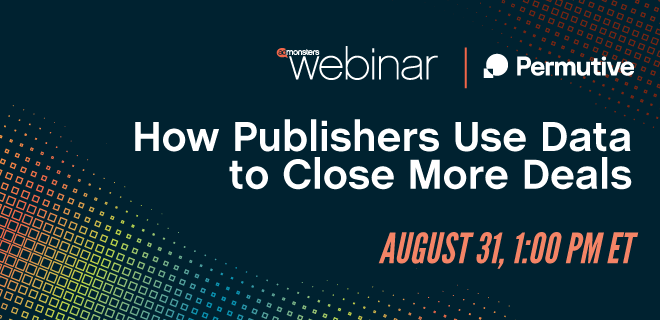
One of the major concerns in the ad tech industry for both publishers and advertisers is improving the consumer experience.
Many in the industry were compelled to self-reflect on their consumer engagement tactics after privacy regulations changed, but what new practices are coming to the forefront to help find new solutions?
Questions have mounted around data ethics, effectively retrieving consumer data without third-party cookies and future-proofing businesses. Essentially, the industry is looking to create a new norm for cultivating a beneficial user experience, but the answer still remains on how the industry will manage data retrieval responsibly.
In preparation for our upcoming webinar with Permutive: How Publishers Can Use Data to Close More Deals With Advertisers, Wednesday, August 31 at 1 PM ET, (Register Now!) I spoke with Thomas Baart, Customer Success Manager, EMEA, Permutive. We discussed how publishers and advertisers can deliver more responsible advertising to consumers, using first-party data to retrieve consumer data, how publishers can be better consultants to advertisers to improve revenue insights, and the legitimacy of zero-party data.
 Andrew Byrd: As consumers increasingly opt out of sharing their information for advertising, how can media companies, advertisers, and ad tech companies come together to deliver more responsible advertising and how is data ethics a part of that?
Andrew Byrd: As consumers increasingly opt out of sharing their information for advertising, how can media companies, advertisers, and ad tech companies come together to deliver more responsible advertising and how is data ethics a part of that?
Thomas Baart: Data ethics is non-negotiable now, publishers and advertisers (as data owners) need to be responsible with the data they collect and how they activate audiences – or risk consumers opting out en masse. Today, almost 40% of users are browsing in cookieless environments, and Permutive research shows that up to 55% of users in Europe are hitting ‘reject all’ on cookies.
In an industry facing increasing regulatory pressure, dwindling consumer trust, and reduced addressability, publishers, advertisers, and ad tech companies must be responsible with data and build on first-party, non-PII, consented data.
The ingredients that will enable publishers, advertisers, and ad tech to work more responsibly include:
- On-device processing to securely capture data at speed with no data leakage
- Activating audiences via Publisher Cohorts, targeting groups with common attributes and behaviors, versus exposing individual identifiers that can be aggregated downstream
- Building on top of consented first-party data that is sustainable and not impacted by the changes disrupting the advertising industry
- More direct relationships between publishers and advertisers
Regarding ad tech and a more responsible web, publishers and advertisers need to work with technologies built from the ground up for consent, privacy, and transparency. Work with ad tech where they are a data processor and not a controller because ad tech as a controller breaks when opt-out rates increase. Adtech should be an enabler of collaboration between publishers and advertisers, not an intermediary.
AB: Even though Google has delayed the third-party cookie crackdown, privacy regulations are mounting. The advertising ecosystem is still concerned about effectively retrieving and utilizing consumer data. Will first-party data be an effective solution to this problem?
TB: I think most people in the industry anticipated that Google would delay the deprecation of third-party cookies again; however that should not stop advertisers and publishers from continuing to invest in a strong, competitive first-party data strategy.
It’s important to be proactive. The biggest threat to publishers and advertisers is inaction. We know consumers are demanding companies handle their data more ethically, In fact, a Harris Poll survey, commissioned by Permutive, shows that 75% of consumers are not comfortable purchasing from brands with poor data ethics. Regulators also continue to create privacy legislation to protect user privacy and browsers like Safari and Firefox made third-party cookies redundant long ago.
First-party data has proven that it works better and delivers results for publishers and advertisers. We are seeing world-leading publishers and advertisers develop robust and competitive data products on top of contented first-party data. A global beverage CPG brand, for example, course corrected over-indexing in Chrome to reach double the audience that was previously hidden in Safari, helping solve their addressability problems. The campaign delivered 2.1x number of impressions served in Safari vs Chrome, resulting in a 21% lower CPC, compared to the benchmark and a 123% higher CTR compared to the benchmark.
AB: How can publishers become better consultants to their advertisers, especially in terms of leveraging their first-party data and revenue insights to do so? And what are some strategies they can use to future-proof their businesses?
TB: To become better partners to advertisers, publishers need to have the right tools in place to generate valuable and actionable insights to then have better educated, data-driven conversations with buyers.
For a publisher, it’s important to have a clear picture of how advertisers buy your inventory and in what context. It’s important to understand who is buying your inventory, how they are buying, and how that spend is flowing through to your first-party audiences.
Firstly, this knowledge empowers publishers to better position their first-party audiences towards advertisers. Secondly, it equips them to confidently and proactively reach out to clients with ideas on how to increase the programmatic experiences with the publisher. And finally, this type of insight also provides the publisher with the opportunity to move advertisers from the open marketplace to private deals.
AB: There is a lot of current debate on the legitimacy of zero-party data. What are your thoughts on the discussion? Is zero-party data a practical insight? What are the benefits?
TB: Zero-party data is declared first-party data. Declared data is provided directly to a publisher by a user. This includes name, location, job title, email addresses, industry, or preferences about specific topics.
Declared data is valuable because it removes the need to make inferences about the data and what it means, and it’s provided directly and willingly, with controls and permissions in place, by the user. So this becomes useful for practical insights.
However, the challenge with declared data is that it’s difficult to come by. People naturally won’t willingly divulge information about themselves, especially if there is no clear value exchange. So whilst there are creative ways to collect and encourage people to ethically and willingly share information, the volume of declared data is generally low. Therefore, it’s important that publishers and advertisers can leverage tools to scale declared data with machine learning.
Don’t forget to sign up for our webinar with Permutive, How Publishers Can Use Data to Close More Deals With Advertisers, on Wednesday, August 31 @ 1 PM EST (Register now!) We’ll be speaking with Permutive’s Thomas Baart, Customer Success Manager, about Permutive’s partnership with Trusted Media Brand to increase audience size by 22X, increase RFP win rate by 31%, and use first-party data to drive 94% of their direct-sold campaigns.